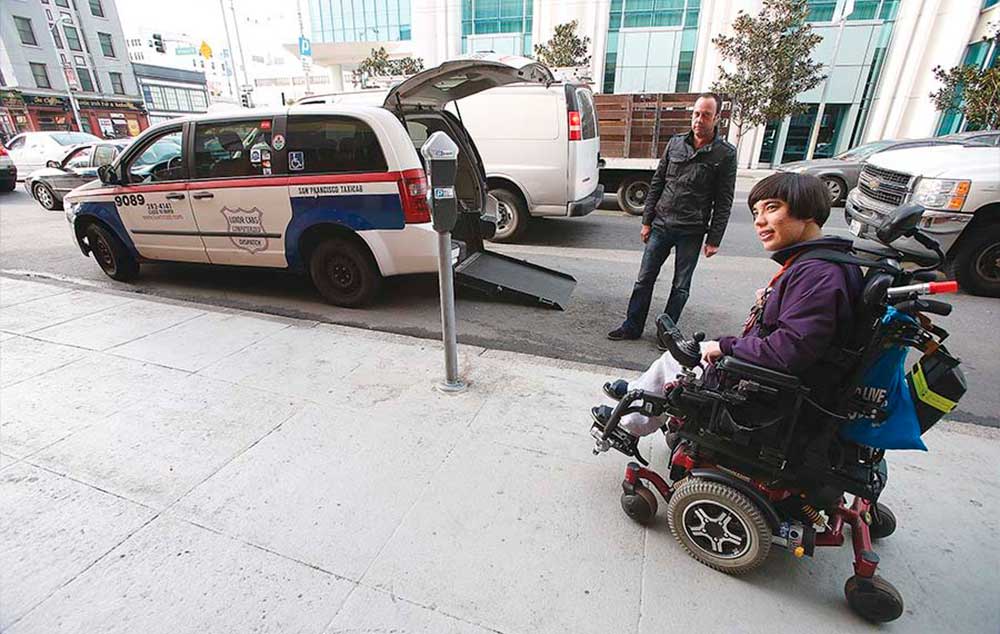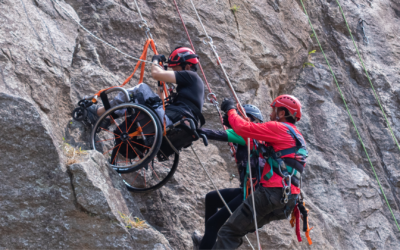
Luxor Cab’s ‘financial strain’ jeopardizes crucial wheelchair taxi trips
Luxor Cab company is so entwined in the fabric of San Francisco, it was deemed a historic “legacy business” by The City’s Historic Preservation Commission in October.
But perhaps less known is that Luxor is also entwined in the fabric of the disability community and provides a majority of for-hire, nonscheduled wheelchair van rides, according to the San Francisco Municipal Transportation Agency.
Now, as Luxor shrinks significantly in the face of financial woes, the fate of for-hire trips from the disability community may lie with its future.
Between December 2015 and November 2016, 12,921 total ramp taxi trips were taken in San Francisco. But 7,582 of those were made by Luxor, meaning that without the cab company, a provider of more than half of The City’s for-hire wheelchair rides would be gone.
Word of Luxor’s financial woes spread through taxi driver gossip networks, eventually reaching fever pitch when the company stopped offering free gasoline at its lot — a decades-long practice — and hung a “For Sale” sign over its property on Jerrold Avenue.
“As far as Luxor going away, that’s not in our plans,” John Lazar, president of Luxor, told the San Francisco Examiner last month.
But, he said, “We’re in a financial strain.”
That strain comes from a shortage of drivers, leading Lazar to move the business somewhere smaller and make it leaner, he said. It’s not that the business isn’t out there — Luxor’s phones ring off the hook, he said — it’s that drivers are becoming harder and harder to find.
There are numerous hoops to jump through before becoming a taxi driver, which is regulated by the SFMTA. By contrast, the process of driving for a ride-hail company is more straightforward and regulated by the California Public Utilities Commission.
“Everyone says, ‘We can’t get a cab, can’t get a cab.’ Well, the owners of the companies can’t get a cab,” Lazar said.
And that may spell trouble for ramp-taxi services.
Lazar’s father started offering ramp taxis in 1979, after his mother’s leg was amputated and she began depending on wheelchairs.
“My dad said it’s a great thing to do,” Lazar said. “That’s how it all started. Who picks up the most wheelchairs? They all say Lazar.”
Those wheelchair cabs are run at a loss, he said.
But in recent times, Luxor’s fleet as a whole dwindled from 240 cabs in 2014 to 140 cabs this year.
Luxor hasn’t yet reached the same level of financial strain as Yellow Cab Co-Op, which was financially crippled by a number of collisions and subsequent lawsuits, prompting the company to file for Chapter 11 bankruptcy. Still, taxi insiders note Luxor’s woes mirror those of Yellow Cab.
Jessica Lehman, executive director of Senior & Disability Action, said if Luxor falls into bankruptcy or shrinks its service, it would be problematic for the local disability community.
People who use wheelchairs every day used to be able to count on getting a ramp taxi when they called, she said, adding, “Now, you can’t count on it anymore.”
In January 2013, there were as many as 1,400 wheelchair taxi trips taken in The City, according to data previously provided by the SFMTA. The latest data shows that amount nearly halved: There were 767 wheelchair taxi trips in January 2016.
From December 2015 to April 2016, the number of monthly wheelchair taxi trips hovered at about 800.
That’s not because there’s a lack of demand for trips, said Kate Toran, head of taxi services at the SFMTA, but because there aren’t enough cabs to provide them.
Those missing rides aren’t being picked up by ride-hails like Uber and Lyft, which don’t have vast wheelchair-ramp equipped fleets and aren’t required by state regulators to do so.
Toran told the Examiner that if Luxor is unable to keep up with ramp services or closed entirely, the SFMTA may explore offering incentives to drivers of other companies to pick up the slack.
“It’s something we’re committed to,” Toran said of wheelchair ramp service. “If the vehicles aren’t operating at Luxor the hope is they would be provided by another taxi company.”
But most local taxi services are feeling the sting of lost business to ride-hails like Uber and Lyft.
Lehman voiced frustration at the popular narrative that Uber and Lyft expanded transportation options for the public.
“Unless, oh, I’m in a wheelchair, and I can’t get in Uber or Lyft because they don’t have accessible wheelchair vehicles,” Lehman said, or not enough wheelchair service “to make it work.”
Uber recently dipped its toes into providing ramp-equipped vans for wheelchairs in San Francisco.
Jennifer Mendoza is one of only three drivers in its Bay Area wheelchair-ramp van program, two of whom operate in The City, she told the Examiner.
Right now, that program is still subsidized by Uber, as it faces a chicken-or-the-egg problem: Having so few drivers means wheelchair-using riders are hesitant to sign up for Uber, as Mendoza often has to turn down rides while providing rides to others.
“There’s absolutely a need for more drivers,” Mendoza said. “There are times when we can’t cover the demand we have.”
But until Uber sees an even larger swell of riders, she fears it won’t recruit more wheelchair van drivers, which often require costly upgrades to accommodate modern wheelchairs — sometimes upwards of $10,000.
Uber confirmed it has a few ramp taxis operating in San Francisco and that it plans on recruiting more drivers this year.
Transportation options geared toward wheelchair users making advanced plans — as opposed to the impromptu nature of taxis or ride-hails — are heavily subsidized by government and still abundant, said Toran of the SFMTA.
But like anyone else, Lehman pointed out, many in the disability community need a service for that last-second travel need — a rescheduled appointment, an unforeseen chore or even a missed bus.
Those options are dwindling, she said.
“We can’t just let ‘the market’ do its thing and assume it works out,” Lehman said.
Right now, the market may have its way with Luxor Cab. And that, Lehman said, may affect wheelchair-users the hardest.
Source: Examiner
Compartilhe
Use os ícones flutuantes na borda lateral esquerda desta página
Siga-nos!
Envolva-se em nosso conteúdo, seus comentários são bem-vindos!
Artigos relacionados
Teleton AACD. A pessoa com deficiência como protagonista.
Teleton AACD. A pessoa com deficiência como protagonista. Uma iniciativa internacional abraçada pelo SBT no Brasil.
Acessibilidade no ESG. Equipotel aborda o tema para o turismo.
Acessibilidade no ESG, para o mercado do turismo. Equipotel aborda a importância da inclusão da pessoa com deficiência.
Morte Sobre Rodas. Filme inclusivo foi candidato ao Oscar.
Morte Sobre Rodas. Dois protagonistas do filme, são pessoas com deficiência, um usuário de cadeira de rodas e outro com paralisia cerebral.






0 comentários